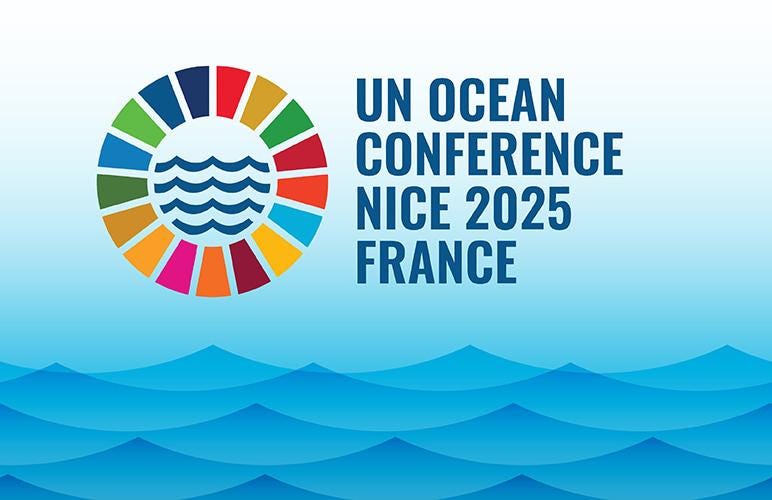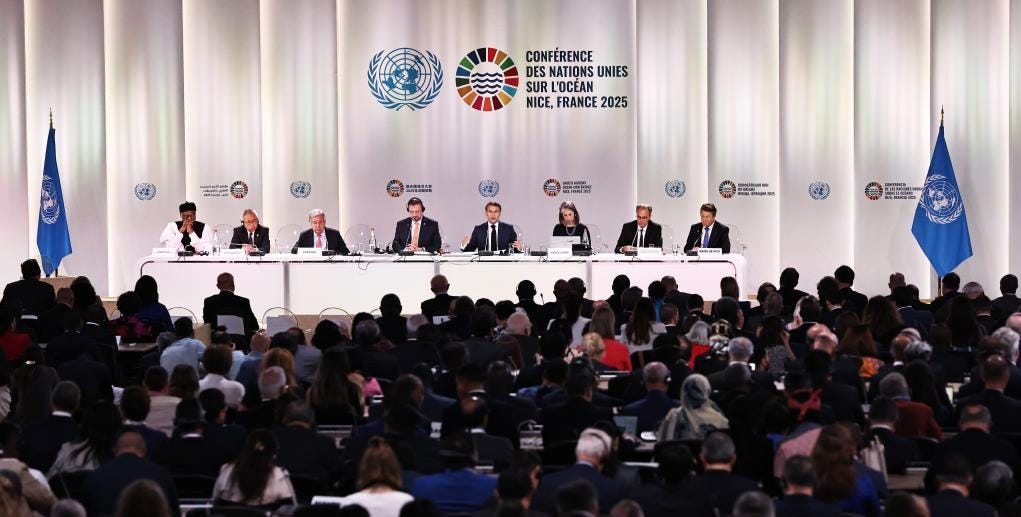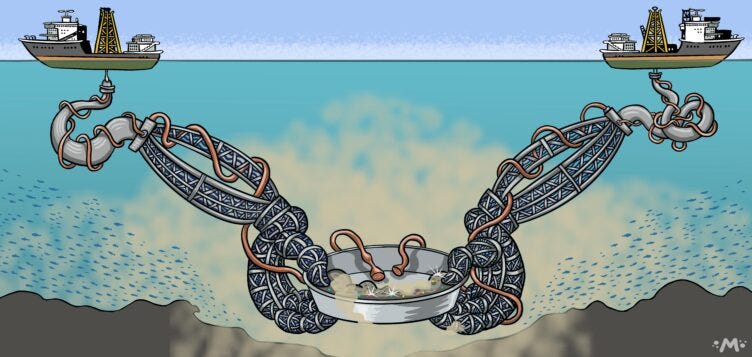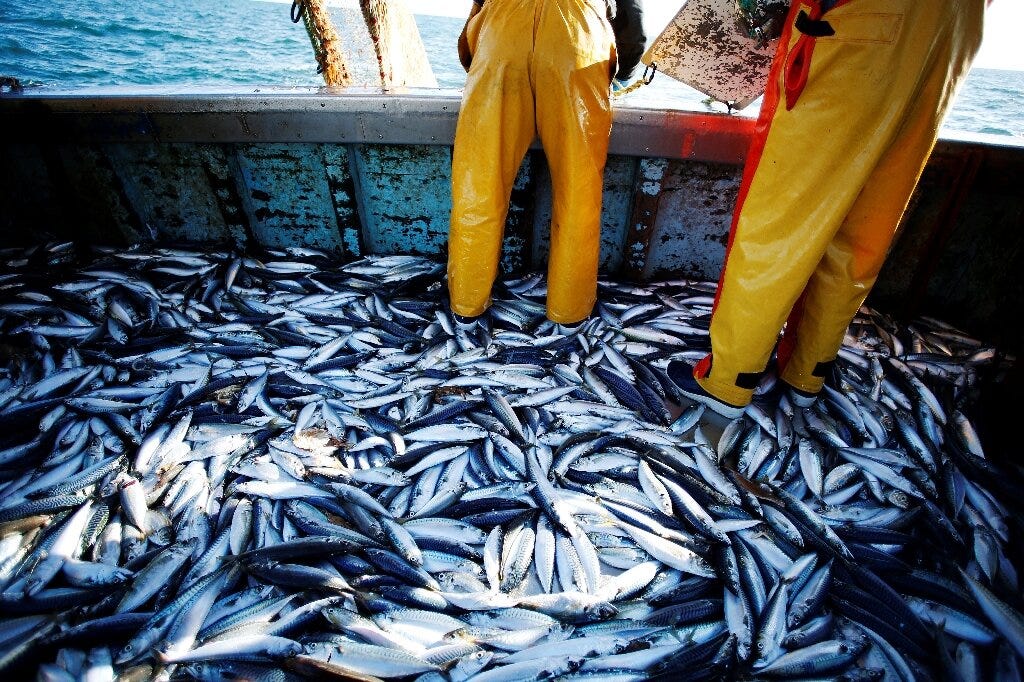Business as usual, but dressed in blue.
What the UN Ocean Conference didn’t want to say — but couldn’t quite hide.
UNOC3 was supposed to somehow help protect the ocean. Oh, well…
As you may have seen in our recent coverage, the United Nations Ocean Conference (UNOC3) wrapped up in Nice last week. Over 2,000 participants gathered — heads of state, ministers, scientists, Indigenous leaders, UN agencies, and hundreds of NGOs — to work on a path toward a “healthier ocean.”
It was meant to be bold. Urgent. Groundbreaking.
Instead, it was… predictable.
Yes, there were powerful speeches. Yes, declarations were signed. Yes, millions were pledged.
But when you strip away the optics, you’re left with the same uncomfortable truth:
The world is treating the ocean like a business plan, never a living system.
And the language used at UNOC3 reveals everything.
Scroll down to read what they didn’t want you to see.
The sea is not a spreadsheet, but apparently that’s what they think
In the opening sessions, words like “blue economy,” “aquatic food systems,” “sustainable seafood,” “climate resilience,” and “marine protein” were repeated like gospel.
But the sea was not spoken of as alive.
The ocean was referenced in terms of carbon storage, biodiversity credits, caloric outputs, and logistical scalability. The life within it — whales, sharks, tuna, plankton — became units of value in global supply chains.
This wasn’t a conference on ocean protection.
What they said — and what they didn’t
French president Emmanuel Macron opened with praise for MPAs — Marine Protected Areas — while ignoring the fact that the vast majority of French MPAs allow bottom trawling and industrial extraction.
The European Union called itself a leader in marine protection — then defended its support for deep-sea mining exploration and subsidized industrial fishing fleets that strip-mine waters in West Africa, Latin America, and the South Pacific.
Yes, EU delegations emphasized the Union’s “leadership role in marine conservation” and support for the BBNJ Treaty (key to stop deep-sea mining from happening) and 30x30 MPA targets.
Yet, the EU continues to fund exploratory contracts for deep-sea mining via companies like Ifremer (France) and GSR (Belgium), both active within the International Seabed Authority (ISA).
There were whole panels on “sustainable fisheries” that didn’t mentioned:
Overfishing
Bycatch
Ghost gear
Tuna population crashes
Octopus factory farms
The use of fishmeal to feed other farmed animals
Marine animal sentience
There were no sessions on dolphin slaughter in Taiji, no sessions on the Faroe Islands grind, no sessions on the 100,000+ whales and dolphins entangled in global fishing gear every year.
It was a conference about the ocean without the ocean in it.
“Blue economy” sounds nice. Until you ask: blue for who?
UNOC3 pushed hard for “blue finance” — a wave of investment in the “sustainable use” of the ocean. That includes:
Blue bonds (debt-for-nature swaps)
Ocean investment funds
Biodiversity offset markets
Blue carbon credits (mangroves, seagrasses, kelp)
In theory, this money could support ocean restoration.
In practice, much of it is flowing to multinational seafood companies, tech-driven aquaculture projects, and governments seeking to greenwash ongoing exploitation.
Discussions on “blue economy” and “ocean investment” increasingly framed marine life in financial terms, emphasizing their role in carbon sequestration and climate resilience. They are assets.
*A reminder: these “assets” include sentient beings who feel pain, joy, fear, and stress.
The problem isn’t just that ecosystems are being destroyed.
It’s that they’re being destroyed by people who no longer see them as alive.
Meanwhile, the deep sea is under threat
Deep-sea mining was the elephant in the room — and sometimes, in the spotlight.
French Polynesia, France, Palau, Panama, the Marshall Islands, and Costa Rica all issued statements reaffirming their opposition to deep-sea mining, joining a growing global movement for a moratorium.
But the International Seabed Authority (ISA) — a body that has never denied a mining request — is still moving forward with licensing regulations that would allow exploitation to begin as soon as 2026.
UNOC3 made one thing clear: Governments are stalling with delay tactics while preparing for extraction.
Even when countries say they oppose deep-sea mining, many continue to invest in research, licensing, and partnerships that will enable it once the political timing is right.
The rhetoric is precautionary.
The action is extractive.
A tale of two oceans
NOC3 showed us a split worldview.
On one side:
Indigenous leaders calling for bans on industrial fishing in sacred waters
Scientists warning of mass extinction in marine ecosystems
Small island nations pleading for recognition that ocean collapse equals cultural extinction
On the other:
Bureaucrats selling ocean health as an “investment opportunity”
Governments championing “sustainable trawling” and “precision aquaculture”
Corporations marketing AI-enabled seafood platforms while still depending on exploited labor and wild stock depletion
One sees the ocean as a living ancestor.
The other sees it as a data point.
The real ocean isn’t managed in spreadsheets
If the ocean dies, it won’t be because we didn’t have enough partnerships or panels.
It’ll be because we let destruction be reframed as development, collapse be disguised as coordination, and animal suffering be rewritten as seafood supply chain resilience.
UNOC3 talked about “life below water.” But it was a conference that erased life.
Where were the voices for marine sentience?
Where were the calls to phase out industrial fishing?
Where was the recognition that we cannot protect biodiversity while extracting it?
The inconvenient truth: fish are disappearing — and so is culture
In coastal West Africa, fish populations have collapsed — not because of overconsumption by locals, but because of foreign fleets: Chinese, European, and Russian industrial ships dragging the seabed and exporting catch to Asia and Europe.
In the Pacific, communities are being displaced by fake marine conservation zones that permit extractive tourism or industrial leases.
In the Arctic, ice melt is opening up new shipping and fishing lanes — and corporations are racing to exploit them, instead of protecting what's left.
When fish disappear, culture disappears. Language, ceremony, oral memory. Stories. Whole relationships with place.
No one at UNOC3 seemed willing to admit that.
What you can do
UNOC3 is over. But the ocean still needs you.
Reject the language of commodification. Refuse to refer to living creatures as “aquatic protein.”
Demand real protections. Marine Protected Areas must be no-take.
Support Indigenous stewardship rooted in local knowledge, not export profit.
Say no to deep-sea mining. Pressure your government to sign the moratorium.
Center marine sentience. Push for octopuses, whales, and fish to be recognized as sentient and protected as such.
This isn’t just about climate.
It’s about life.
And about who gets to decide what the ocean is for.
If we allow financial logic to define ocean policy, then the future of marine life will be nothing more than a line item.
We can’t let that happen.
Because the ocean doesn’t need management plans.
It needs guardians.
Stay loud, stay informed, stay active.









